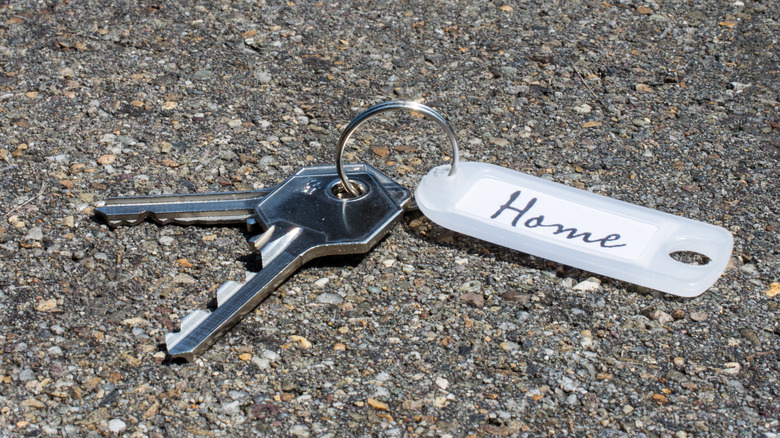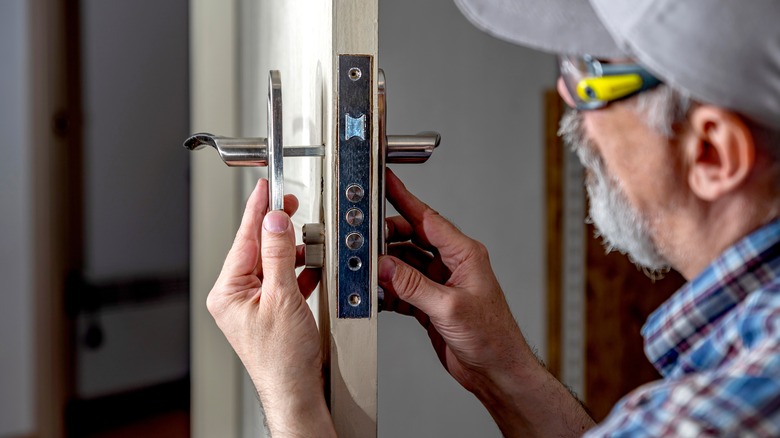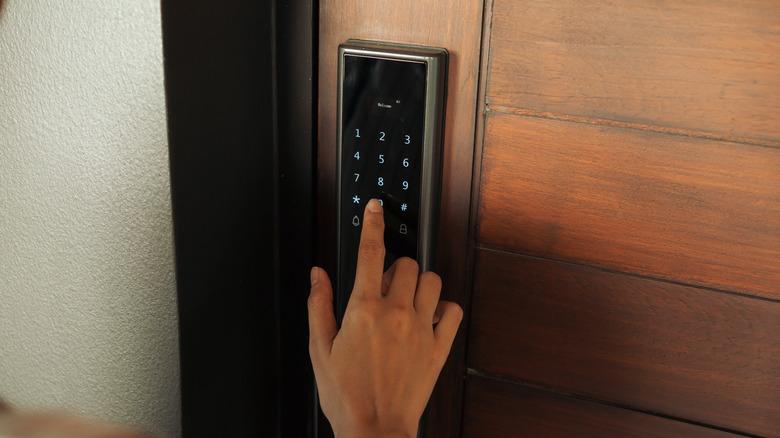Important Things To Do Immediately After Losing The Key To Your Door
If you've ever lost your house keys, you know that terrible pit in your stomach that comes along with it; after all, your home isn't just your fortress, it's also where the most important people and things in your life reside, so losing your keys is — and should be — cause for alarm. That said, there's no reason to run around like a chicken with its head cut off. Instead, there are several important steps you can take to re-secure your home. (Now might also be a great time to use this fun LEGO hack to avoid misplacing your keys in the future.)
The first logical step after losing your keys is to consider where you may have lost them. Checking the doors of your home may reveal that your house key is still dangling from the lock. Alternatively, you may have left it in your pocket, purse, or car. While scouring the house for a lost key is no one's idea of a good time, you can save a lot of money if your keys are simply misplaced rather than straight-up lost.
If you don't have any spare keys at home, check with local friends and family to see if you lent them an extra set; while this won't eliminate your need to address security-related concerns, it can buy you a little time. If you fear the worst — that someone has stolen your keys — find overnight accommodations until the concern is addressed.
Replace your locks
If you have lost your house keys, you've probably already realized that new locks and keys are in your future. Changing the locks to your home doesn't require too much time or skill, but given the sensitive nature of home security, many people outsource this task to a professional locksmith. If you're going the replacing-the-locks route, a locksmith can come out and remove the lock from your door before installing a new one with compatible keys.
If your doorknob has a keyhole in it, the locksmith will need to replace the entire doorknob, not just the lock. With this in mind, it's a good idea to take note of the color and finish of your locks and knobs; this way, you can ensure that your locksmith brings a proper replacement so you don't have mismatching knobs or handles.
Replacing the locks on your doors is the most secure way to solve your lost-keys predicament, but it may also cost you a small fortune. Changing a lock can cost as little as $45 or as much as $500, and a normal price range for a lock replacement spans anywhere from $130 to $220. (You can blame this high cost on the price of the hardware.) You may also have to pay your locksmith's labor costs, so keep that in mind.
Rekey your doors
Rekeying your home can be a secure (and more affordable) way to solve your lost-key situation. The process consists of removing the lock cylinder from your door, then reconfiguring and replacing the pins so that the lock is essentially changed. As long as your current locks are in good condition, rekeying is a viable option for most homeowners. Also, since rekeying mostly involves equipment that you already own, it's less expensive than replacing locks. (Yes, you'll need to get new keys cut, but that was already a given when you misplaced your original set.) Rekeying your lock with the help of a professional should cost anywhere from $80 to $160.
If you're done with misplaced keys for good, you may be in the market for a more innovative door-locking system. Keyless or biometric door locks are certainly options for the tech-savvy homeowner, but are they worth the hype? Advertised as being just as secure as traditional locks, electronic locks are connected to your particular credentials (whether that's your fingerprint or a personal passcode), so a casual burglar can't access them. As with any data, however, a sufficiently skilled hacker can always find the chink in your armor. Electronic locks aren't cheap (they can cost as little as $20 or as much as $300), but since you can change the access codes as needed, you'll never have to replace a lock again — at least in theory.


